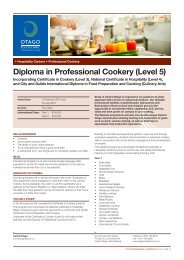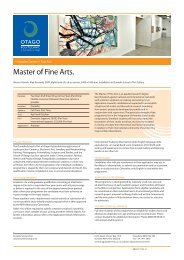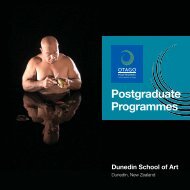06 A - Handbook - Otago Polytechnic
06 A - Handbook - Otago Polytechnic
06 A - Handbook - Otago Polytechnic
You also want an ePaper? Increase the reach of your titles
YUMPU automatically turns print PDFs into web optimized ePapers that Google loves.
Student Programme <strong>Handbook</strong> 2008 Bachelor of Information Technology<br />
IT319 - Unspecified Credits<br />
This paper is intended to act as a repository for “unspecified credits” where the student undertakes<br />
courses from outside the B.InfoTech. Up to 20 credits of these may normally be used. Any course that<br />
is recognised as contributing to a degree may be used for these credits. The contribution to a student’s<br />
credit count will be calculated on the basis of EFTS contribution of the external paper (ie 0.166 EFTS =<br />
20 credits).<br />
IT321 Object Oriented Systems Development<br />
This paper enables you to undertake further practice in software development including design,<br />
programming and implementation of both large and small scale contemporary systems including<br />
Windows applications, web applications and web services. You will gain advanced understanding and<br />
abilities in object–oriented programming, client–server architecture and component–based architecture.<br />
You will become more familiar with the Unified Modelling Language and use it for planning, developing<br />
and documenting systems.<br />
IT324 Algorithms and Data Structures<br />
This course aims to give students advanced programming skills that are transferable across programming<br />
platforms. Computer programming is a problem-solving discipline independent of the constructs of a<br />
particular programming language. An efficient programming solution requires development of both a<br />
correct, efficient algorithm, and the selection of appropriate date structures. This course intends to<br />
acquaint students with the wide variety of tools and constructs available for this development, and to train<br />
them to analyse the efficiency and correctness of their chosen solution. Students will apply the theoretical<br />
material presented in the course in a variety of computer programming assignments that will emphasise<br />
the ubiquitousness of the programming discipline in Information Technology.<br />
IT326 Active Directory Administration<br />
Students learn the knowledge, skills, and abilities necessary to work with Microsoft Active Directory<br />
directory services. They will engage in planning, implementing, and maintaining forests, sites, domains,<br />
and organisational units (OUs) that meet the accessibility, performance, and security goals of a business<br />
plan. In addition, students use Group Policy to deploy software and configure a computer or user<br />
environment. Finally, students learn troubleshooting techniques that are valuable for the maintenance of<br />
a network environment.<br />
IT327 Web Programming 3<br />
To give students a thorough introduction to modern techniques for adding programmed behaviours to web<br />
pages. The course will include a review of basic network architecture and the currently supported HTML<br />
dialect. It will present a variety of languages and applications adding dynamic graphics, etc. As this is a<br />
rapidly changing field, the contents and tools will be regularly reviewed and updated as required<br />
discipline currency.<br />
© <strong>Otago</strong> <strong>Polytechnic</strong> 29








